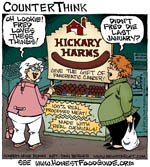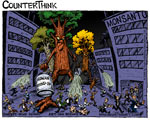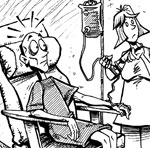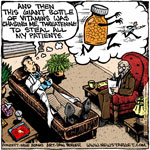Raising Serotonin Levels - The Right Way to Use 5-HTP
| Share on Facebook | Share on Twitter | Share on Google+ |
This is an article about how to increase serotonin levels naturally without increasing them too much. Many readers will find the content of this article just a little technical, but it is intended to explain the why's as well as the how's of increasing serotonin levels naturally. If you are impatient with the explanation, just skip to the bullet points at the end.
Regulating serotonin is key to many neurological conditions, not just depression. Getting the right amount of serotonin the brain in relationship to serotonin in the rest of the body is an important issue in many neurological conditions. Millions of people who deal with depression are given serotonin-reuptake inhibitors to boost serotonin levels in the brain. (Read more about Serotonin and Depression).
People with Parkinson's disease suffer a disease primarily related to dopamine disruptions, but their symptoms often lead, very understandably, to depression. Many experts believe that one of the underlying causes of autism is overproduction of serotonin in the gastrointestinal tract, causing underproduction in the brain. Serotonin disorders are relevant to Tourette's syndrome, obsessive-compulsive disorder, schizophrenia (See Serotonin and Schizophrenia) , and Alzheimer's disease. But more serotonin is not always better.
Too much serotonin can be as problematic as too little. Just as too little serotonin can cause depression, too much serotonin can cause serotonin syndrome. Excessive production of serotonin can cause diarrhea, irritable bowel, and uncontrollable flatulence, along with racing thoughts, poor impulse control, and disastrous failures of "executive function," the ability to make good life decisions.
 Serotonin syndrome is an occasional problem in using using pharmaceutical "serotonin boosters" to treat depression. It's a frequent problem in using these drugs to treat autism, Tourette's syndrome, OCD, schizophrenia, and Alzheimer's. But increasing serotonin levels by nutritional intervention reduces the risk of increasing serotonin levels too much.
Serotonin syndrome is an occasional problem in using using pharmaceutical "serotonin boosters" to treat depression. It's a frequent problem in using these drugs to treat autism, Tourette's syndrome, OCD, schizophrenia, and Alzheimer's. But increasing serotonin levels by nutritional intervention reduces the risk of increasing serotonin levels too much.
Tryptophan is the natural serotonin booster, but diet and vitamin status affect how well it works. What are the natural serotonin boosters? The brain makes serotonin from the amino acid tryptophan. Most people get about 1 gram, or 1/28 of an ounce, of tryptophan in their diets every day. People who have either lactose intolerance or fructose intolerance (the inability to absorb more than about 25 grams of fructose sugar at a time), and people who just consume too much dairy and too much fruit or high-fructose corn syrup, don't absorb all the tryptophan in their food.
Even if digestion works perfectly, only about 3 per cent of that 1 gram of serotonin actually reaches the brain. That is because the liver also uses this amino acid to make the B vitamin niacin, and the skin pigment melanin. and it has difficulty crossing the blood-brain barrier that protects the brain from blood-borne infections and toxins.
Getting tryptophan past the blood-brain barrier. The blood-brain barrier is effectively a "skin" that interrupts blood flow to the brain. The same kind of cells that are found in the skin and mucus membranes regulate traffic to the brain. They stop bacteria (and antibiotics) and many of the larger molecules that flow easily through the rest of the bloodstream. They also slow down the transport of nutrients.
Insulin helps tryptophan cross the blood-brain barrier. Eating sugary foods (by non-diabetics) triggers release of insulin, and the need to get tryptophan into the brain is the reason many people experience carbohydrate cravings and sugar cravings when they are depressed. Sugar is an effective self-administered medication for mild to moderate depression-but the extra production of insulin also stores fat in belly fat and can eventually lead to insulin resistance and type 2 diabetes.
Tryptophan has to compete with the amino acids leucine and phenylalanine for entry into the brain. If you eat a lot of foods that are high in leucine and phenylalanine, then your brain will absorb less of the tryptophan it needs for making serotonin. Some foods that are high in leucine and phenylalanine are, in decreasing order of leucine + phenylalanine content:
- Dried egg white (rehydrated for use in cooking, or as part of a cake or cookie mix)
- Whale meat
- Soy protein isolates
- Soy flour
- Dried tofu
- Parmesan cheese
- Fried pork rinds (the American snack food)
- Gruyere cheese
- Romano cheese
- Veal
- Gelatin/jelly/Jell-o
- Roast beef
- Roast lamb
- Seal
- Chicken giblets
- Sesame seeds
When these foods are eaten in large amounts, the brain has difficulty absorbing tryptophan. On the other hand, certain foods are relatively low in leucine and phenylalanine but high in tryptophan, such as:
- Tahini
- Mung beans
- Most nuts
- Quinoa
- Rice
- Tapioca
- Black-eyed peas
- Pinto beans
- Any tart fruit
The problem with relying on diet to increase tryptophan levels is that even the foods that are highest in tryptophan are still very high in both leucine and phenylalanine. Eating high-tryptophan foods from the second list with any of the low-tryptophan foods from the first list cancels out their benefits (and if you have depression, it's probably a good idea to avoid the foods on the first list). It is simply a lot more practical to get tryptophan from supplements.
The supplement that is better than tryptophan. If you specifically want to increase serotonin levels to lift depression, then it's best to take a supplement that is already the form of tryptophan the brain uses to make serotonin, 5-hydroxytryptophan, also known as 5-HTP, rather than tryptophan itself. Modern tryptophan supplements are safe, but the supplement can be "too much" for women who have high estrogen levels and for people who have high blood pressure or digestive disorders. Taking 5-HTP provides the brain with the raw materials it needs, without forcing neurons to manufacture or retain serotonin they do not need.
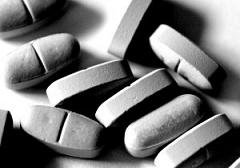 There are certain other supplements that help 5-HTP do its job. The brain uses vitamin B6 in the process of making serotonin. Taking B6 is especially helpful for people who have issues with either alcohol or estrogen. Supplemental vitamin B3 helps preserve tryptophan that otherwise the liver would turn into niacin.
There are certain other supplements that help 5-HTP do its job. The brain uses vitamin B6 in the process of making serotonin. Taking B6 is especially helpful for people who have issues with either alcohol or estrogen. Supplemental vitamin B3 helps preserve tryptophan that otherwise the liver would turn into niacin.
The B vitamins need their own co-factors, so a complete nutritional supplement routine for increasing serotonin levels naturally would be:
- 100 mg of 5-HTP
- 20 mg of vitamin B6
- 50 mg of vitamin B3 (niacin)
- 200 micrograms of folic acid
- 200 milligrams of vitamin C
- 100 IU of natural vitamin E
It is not necessary to follow these proportions exactly, but it is helpful to get all of the nutrients that help the body preserve tryptophan and that help the brain make serotonin. It is better to take your 5-HTP when your stomach is "protein-free," on an empty stomach, so more of the 5-HTP can cross the blood-brain barrier.
It's also important to take vitamin B6 at a different time, not taking 5-HTP and vitamin B6 at the same time. That is because the stomach and intestines also make serotonin, and vitamin B6 could cause the transformation of 5-HTP into serotonin in the gut, not in the brain.
More is not necessarily better. If you take 5-HTP, there is very little risk of serotonin syndrome, but there's simply no need to take more of a supplement than your body can use. If you experience digestive upset, reduce your dose, and if you start feeling good-don't change a routine that works. Do not stop taking any prescription antidepressant without your doctor's approval, and wait at least four (preferably six) weeks after stopping prescription drugs before you begin supplements to avoid a condition known as serotonin syndrome.
-
Skin CareMen Skin Care
-
Free ResourcesFree eBooks
-
Be careful in reading health books. You may die of a misprint.Mark Twain
-
Featured Health Supplement"...I also suffer from mild-to-moderate depression, so several months ago as an experiment I ordered a few bottles of the Neuro-Natural Serenity formula, but never took it consistently. However, I started taking it faithfully last week at full dose and already my spirits are lifting and I have a greater clarity of mind."
Cathi, USA -
